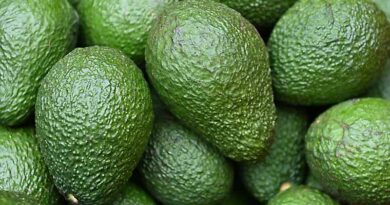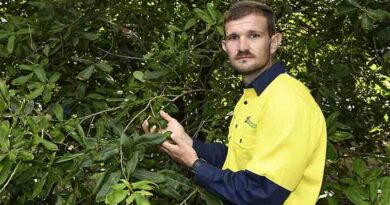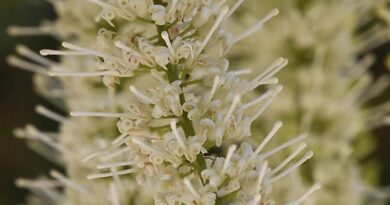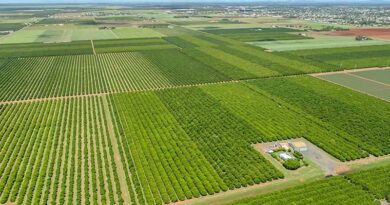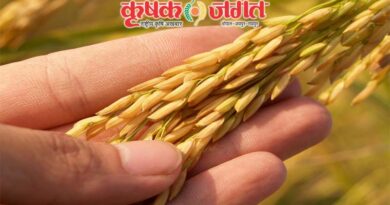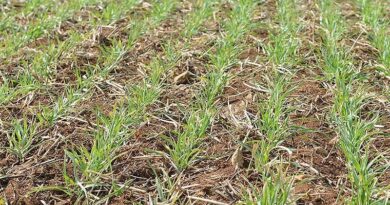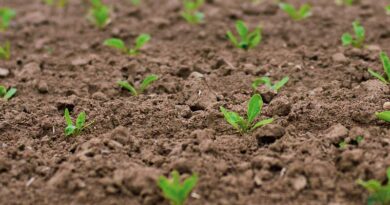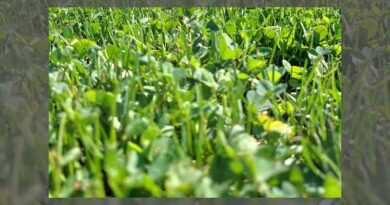Softer product approach pays dividends for Macadamia grower
16 November 2022, AU: A decision to switch to products that are safer to beneficial insects has worked particularly well for Bundaberg Macadamia grower Andrew Lewis.
Mr Lewis started converting a cane and peanut farm to macadamias in 2016, with the final planting in 2020 and is excited about the prospects for the crop.
“They are a higher returning crop so you can spend more on your inputs”, he said. “Soil health is part of that, so we use a lot of compost and soft chemistries and softer forms of nitrogen and potassium.”
The farm has been working with local Bundaberg firm, Agronica, looking at product options to control a range of pests.
Mr Lewis said beneficial insects, such as spiders, were an important part of the ecosystem and they had conducted trials to determine the difference between harsher and softer products in the orchard.
“We used drop sheets and the results were evident. We counted 150 dead spiders per tree and when we extrapolated that out, it was 45,000 spiders per hectare.”
“When we are not spraying (harsher chemistries) we have 45,000 spiders a hectare out there working for us.”
Safer products used on the macadamias included Prodigy® and Transform® WG, from Corteva Agriscience.
“During flowering we used Prodigy to take out the flower caterpillar. We’ve had excellent results. For fruit-spotting bugs and other insects, we use a combination of Transform and other products.”
“I think farms that are using more targeted chemistries are more sustainable.”
Jonathan McDonald, Agronica, said macadamias had developed rapidly in the region over the last or previous four to five years and the area was well suited to the crop.
He said most key pests they were trying to control, such as fruit-spotting bug and macadamia nut borer, were native to the region.
At the same time, there were many key beneficial predators that had evolved in the area and could play a positive role in macadamia orchards.
“It’s been key to preserve some of those as well as trying to control the native pests,” he said.
A number of beneficial insects have been cultivated and released to assist the pest control in the local area.
“One thing that’s been adopted really well here in town is the release of a micro Hymenoptera or small wasp (Trichogramma) that actually lays within the nut borer eggs,” Mr McDonald said.
“We’re releasing these wasps around that December period and using products during that time to protect these insects.”
“Other micro Hymenoptera are parasitizing fruit-spotting bug eggs and green vegetable bug. They’re there within the orchard and it’s important to try to keep them here.”
Mr McDonald said macadamias were one crop where you could go through the season only using soft insecticide options.
“For the majority of the year we are seeing a build-up of biodiversity in the orchard. It’s about setting a program to make sure that we’re preserving that through the season.”
He said they would generally start to monitor the macadamia crop at flowering and utilise products like Prodigy to control macadamia flower caterpillar.
“We use drop sheets to gauge what predators and beneficials are in the orchard and then make a call on when we start spraying”.
After the initial spray, the orchard continues to be monitored and an insecticide utilised to assist the beneficial insects when needed.
“We use Prodigy because it is so selective on macadamia flower caterpillar,” Mr McDonald said.
“Transform is utilised in that first spray window, post- flowering. We are just waiting until the nut has set and then we will bring Transform in.”
Prodigy is also used at full nut expansion for macadamia nut borer.
“We’re relying on the persistence of Prodigy where we’ve covered that nut. We get really good control on macadamia nut borer in that mid-December window.”
“An early and a late spray of Prodigy gets the best out of the product by using the persistence it has on the crop.”
Mr McDonald helped conduct the drop sheet experiment on the Lewis macadamia property with the experiment comparing Transform insecticide with a synthetic pyrethroid insecticide.
“Transform certainly controlled the pests that we were trying to control and also preserved those spiders that were in the orchard.”
“Some of the jumping spiders are a very active pest on fruit-spotting bug and plenty of other pests,” he said. “There’s an economic value of those spiders.”
Also Read: CropLife India appoints Durgesh C Sharma as the new Secretary General
(For Latest Agriculture News & Updates, follow Krishak Jagat on Google News)


